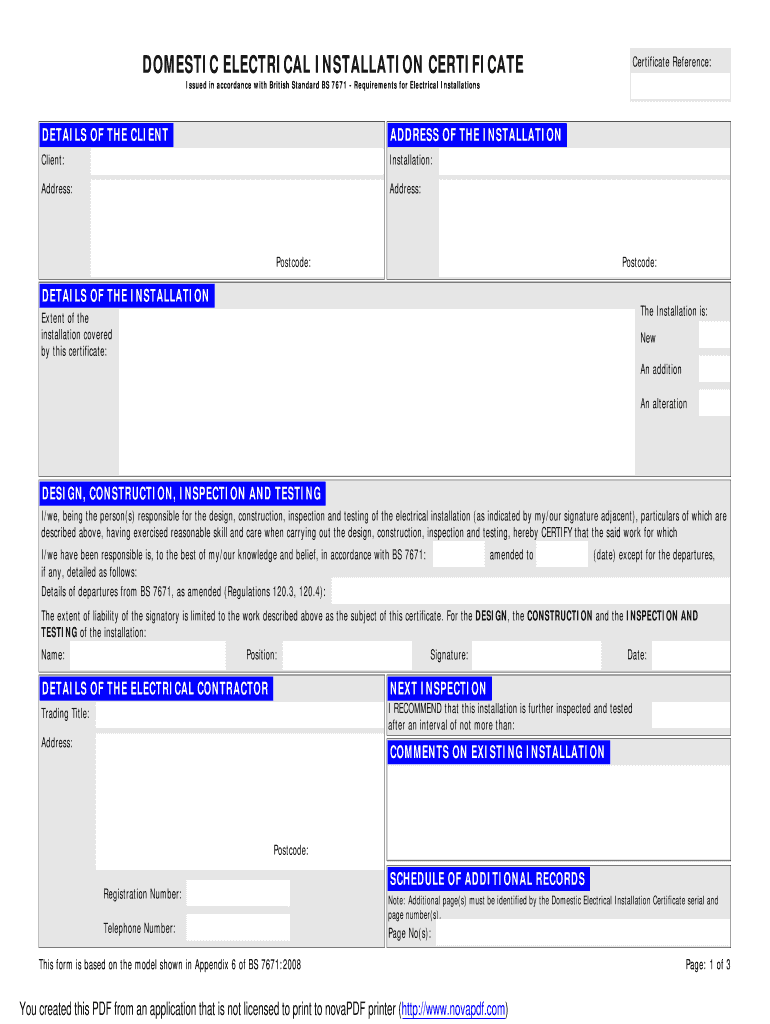Have you ever wondered about the importance of a Domestic Electrical Installation Certificate? Well, wonder no more! In this article, we will explore the significance of this document and how it plays a crucial role in ensuring the safety and functionality of electrical systems in your home. Whether you are a homeowner or a tenant, understanding the purpose and importance of this certificate is essential for maintaining a secure and reliable electrical infrastructure. So, let’s dive right into it and discover why the domestic electrical installation certificate is a must-have for every household.
What is a Domestic Electrical Installation Certificate?
When it comes to the safety and well-being of your home, it’s important to ensure that your electrical installation meets the necessary standards. One way to guarantee this is by obtaining a Domestic Electrical Installation Certificate. This document serves as proof that your electrical installation has been tested and inspected by a qualified professional, ensuring that it is safe and compliant with regulations. In this article, we will explore what a Domestic Electrical Installation Certificate is, why it is important, and how you can obtain one for your home.
Why is a Domestic Electrical Installation Certificate Important?
The safety of your home and your loved ones is paramount, and electrical systems play a crucial role in ensuring this. A Domestic Electrical Installation Certificate is important for several reasons:
- Safety: Electrical faults can lead to severe accidents, including electrical shocks, fires, and even fatalities. By obtaining a Domestic Electrical Installation Certificate, you can have peace of mind knowing that your electrical installation has been thoroughly inspected and meets the required safety standards.
- Compliance: Electrical installations must adhere to certain regulations and codes to ensure their safety and functionality. A Domestic Electrical Installation Certificate serves as proof that your electrical installation complies with these regulations, giving you confidence in its reliability.
- Insurance: Many insurance companies require a valid Domestic Electrical Installation Certificate before providing coverage for your home. This certificate demonstrates that your electrical system is safe and reduces the risk of electrical-related incidents, thus lowering their liability.
Who Issues a Domestic Electrical Installation Certificate?
A Domestic Electrical Installation Certificate is issued by a qualified electrician who has conducted thorough testing and inspection of the electrical installation in your home. These electricians are trained and registered with relevant governing bodies that ensure their competence in carrying out such inspections. It is crucial to hire a qualified electrician to perform these tests to ensure the accuracy and integrity of the certificate.
What Does a Domestic Electrical Installation Certificate Include?
A comprehensive Domestic Electrical Installation Certificate typically includes the following information:
- Property Details: This section includes the address of the property where the electrical installation has been examined.
- Inspection Details: The certificate includes the date and time of the inspection, as well as the name and registration number of the electrician who conducted it.
- Observations and Recommendations: Any observations made during the inspection, as well as recommendations for improvements or repairs, are documented in this section. These recommendations are essential for addressing any potential safety hazards or issues with the electrical installation.
- Test Results: The certificate also includes the test results of various electrical components, such as circuits, cables, switches, and sockets. These test results provide an overview of the condition and performance of the electrical system.
- Certification: Finally, the certificate contains a declaration stating that the electrical installation complies with the necessary standards and regulations. This certification verifies the safety and reliability of your electrical system.
How Can You Obtain a Domestic Electrical Installation Certificate?
To obtain a Domestic Electrical Installation Certificate, you will need to engage the services of a qualified electrician. Here is a step-by-step guide on how you can obtain this certificate for your home:
- Research and Hire a Qualified Electrician: Look for electricians in your area who are registered and certified by recognized governing bodies. Check their credentials, qualifications, and customer reviews to ensure they are reliable and experienced.
- Schedule an Inspection: Contact the electrician and arrange a convenient time for them to inspect your electrical installation. Ensure that the inspector will conduct a thorough examination of all the electrical components and systems in your home.
- Inspection Process: During the inspection, the electrician will conduct tests, check for any faults or potential safety hazards, and assess the overall condition of your electrical installation. They will also examine the electrical system’s compliance with relevant regulations and codes.
- Receive the Certificate: After completing the inspection, the electrician will provide you with a Domestic Electrical Installation Certificate if your electrical installation meets the necessary standards. This certificate will serve as proof of compliance and safety for your home.
Remember, it is advisable to keep a copy of the certificate for your records and provide it to relevant parties, such as insurance companies or potential buyers, if required.
Conclusion
A Domestic Electrical Installation Certificate is a crucial document that verifies the safety and compliance of your home’s electrical installation. By obtaining this certificate, you can ensure the well-being of your loved ones, meet regulatory requirements, and potentially lower your insurance premiums. Don’t overlook the importance of a Domestic Electrical Installation Certificate and make sure to engage the services of a qualified electrician to carry out the necessary inspections for your peace of mind. Stay safe and enjoy the benefits of a properly installed and tested electrical system.



